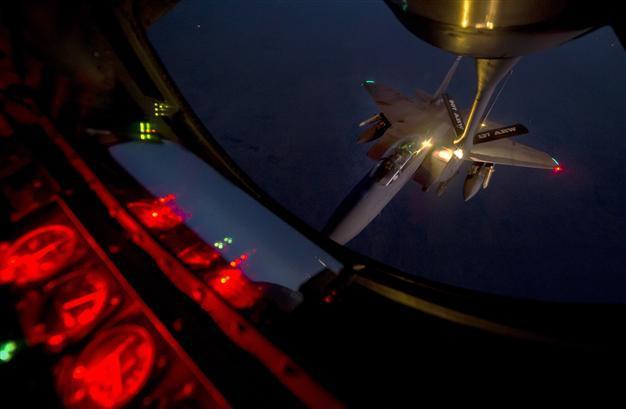ISIL defies air strikes by shelling Kobane
BEIRUT / MÜRŞİTPINAR

In this Tuesday, Sept. 23 photo provided by the US Air Force, a F-15E Strike Eagle receives fuel from a KC-135 Stratotanker over northern Iraq after conducting airstrikes in Syria. US coalition-led warplanes struck ISIL militants near the northern Syrian town of Kobane. AP Photo
New U.S.-led air strikes against fighters of the Islamic State in Iraq and the Levant (ISIL) failed to stop them from pressing their assault on a strategic Syrian town near the Turkish border on Sept. 27, hitting it with shell fire for the first time.The U.S. Central Command (Centcom) said the air strikes destroyed an ISIL building and two armed vehicles near the border town of Kobane, which the insurgents have been besieging for the past 10 days.
It said an airfield, garrison and training camp near the ISIL stronghold of Raqqa were also among the targets damaged in seven air strikes conducted by the United States, Saudi Arabia, Jordan and the United Arab Emirates, using fighter planes and remotely piloted aircraft.
Three air strikes in Iraq destroyed four ISIL armed vehicles and a "fighting position" southwest of Arbil, Centcom said. Two British fighter jets also flew over Iraq, a day after the UK parliament authorised bombing raids against ISIL militants there, but used the mission to gather intelligence rather than carry out air strikes, the ministry of defence said.
Since capturing swathes of territory in both Syria and Iraq, ISIL has proclaimed an Islamic "caliphate", beheaded Western hostages and ordered Shiites and non-Muslims to convert or die. Its rise has prompted President Barack Obama to order U.S. forces back into Iraq, which they left in 2011, and to go into action over Syria for the first time.
The U.S. military has been carrying out strikes in Iraq since Aug. 8 and in Syria, with the help of Arab allies, since Tuesday, in a campaign it says is aimed at "degrading and destroying" the militants.
Al-Qaeda's affiliate in Syria, which lost scores of fighters in the first day of strikes there, accused Washington and its allies of waging "war against Islam" and said they would be targeted by jihadists around the world.
The Syrian Observatory for Human Rights, a monitoring group that supports opposition forces fighting Syrian President Bashar al-Assad, said air strikes set off more than 30 explosions in Raqqa.
Rami Abdulrahman, who runs the British-based Observatory, said 23 ISIL fighters were killed. He said the heaviest casualties were inflicted in attacks on an airport.
But the monitoring group said ISIL was still able to shell eastern parts of Kobani, wounding several people. It said that ISIL fighters had killed 40 Kurdish militia in the past five days in their battle for the town, including some who were killed by a suicide bomber who drove into its outskirts in a vehicle disguised to look as though it was carrying humanitarian aid.
The insurgents' offensive against the Kurdish town, also known as Ayn al-Arab, has prompted around 150,000 refugees to pour across the border into Turkey since last week.
Turkish officials near the Syrian border said ISIL fighters battling Kurdish forces for Kobane sent four mortar shells into Turkish territory, wounding two people.
One of the shells hit a minibus near Tavşanlı, a Turkish village within sight of Kobani. A large hole was visible in the rear of the vehicle.
"Two people were injured in the face when the minibus was hit. If they'd been 3 metres (10 feet) closer to the car, many people would have died," said Abuzer Kelepçe, a provincial official from the Peoples' Democratic Party.
Heavy weapons fire was audible, and authorities blocked off the road towards the border. "The situation has intensified since the morning. We are not letting anyone through right now because it is not secure at all. There is constant fighting, you can hear it," the official said.
Kobane sits on a road linking north and northwestern Syria. ISIL militants were repulsed by local forces, backed by Kurdish fighters from Turkey, when they tried to take it in July, and that failure has so far prevented them from consolidating their gains in the region.
Coalition widens
Syria's government, which in the past accused its opponents of being Western agents trying to topple Assad, has not objected to the U.S.-led air strikes, saying it was informed by Washington before they began.
It too has carried out air strikes across the country, including in the east, and its ground forces have recaptured the town of Adra, northeast of Damascus, tightening Assad's grip on territory around the capital.
But Russia has questioned the legality of U.S. and Arab state air strikes in Syria because they were carried out without the approval of Damascus, Moscow's ally.
General Martin Dempsey, chairman of the U.S. Joint Chiefs of Staff, said on Friday that this week's strikes in Syria had disrupted Islamic State's command, control and logistics capabilities. But he said a Western-backed opposition force of 12,000 to 15,000 would be needed to retake areas of eastern Syria controlled by the militants.
















